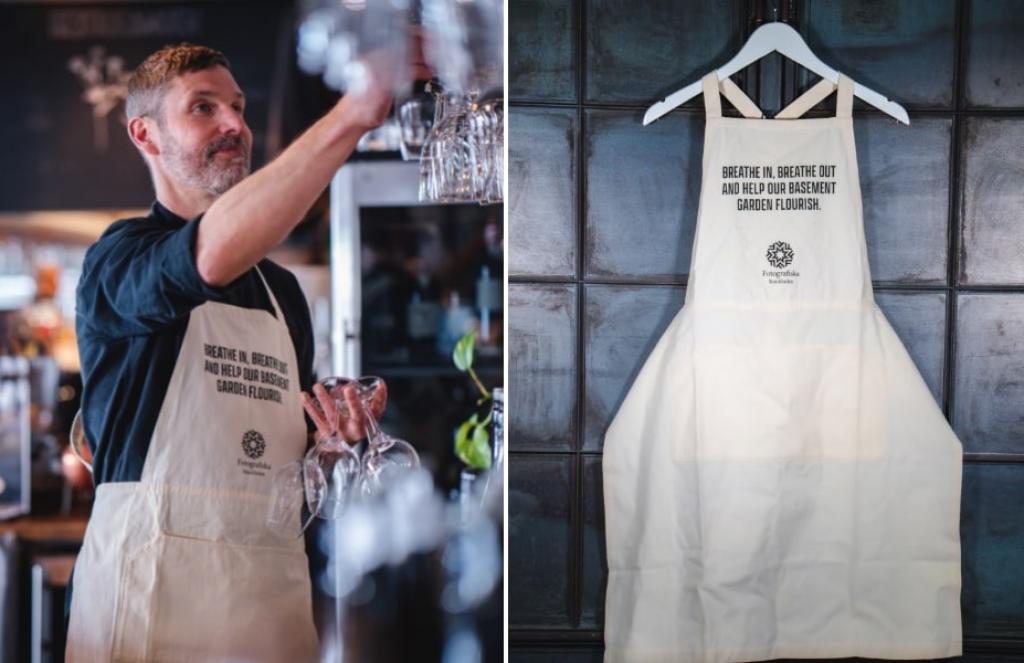Thessaloniki gets ready for its metro launch in November
The underground rapid transit lines have been under construction for almost two decades due to various project delays
 TheMayor.EU logo
TheMayor.EU logo 
You can see the apron "in action" at the Fotografiska gallery restaurant in Stockholm, Source: Fotografiska Stockholm
It is then used to grow plants used in the restaurant’s dishes
It may look like an ordinary kitchen apron at a first glance, but the new work gear worn by staff at the Fotografiska gallery bistro in Stockholm actually captures CO2 from the restaurant’s atmosphere. The aprons are made from an absorbent cotton fabric which when heated releases the carbon dioxide, which is then used as food for the bistro’s hydroponic plant garden. Talk about small scale perfect circularity!
The innovative fashion technology, called Carbon Looper, was developed by the Hong Kong Research Institute of Textiles and Apparel (KHRITA) in conjunction with the H&M Foundation’s Planet First program.
The Carbon Looper project treats cotton garments with an amine-containing solution that allows the surface of the fabric to capture carbon dioxide from the surrounding air. Apparently, it was inspired by the chimneys of coal plants which use something similar to reduce carbon emissions into the atmosphere.
When the working day is over, the staff leave their aprons in the bistro’s greenhouse. The carbon dioxide can then be released from the fabric by heating it to 30-40 °C, where it can be naturally taken up by the plants during photosynthesis. The plants, of course, go on the menu.
The amount of CO2 captured by a garment per day corresponds to about 1/3 of the amount that a tree absorbs per day. After only three 'loop cycles', the garment has effectively climate-neutralized itself - and instead begins to have a climate-positive effect. Improving and scaling up this technology is intensively researched in parallel.
Christiane Dolva, Strategy Lead at H&M Foundation, says about the collaboration with Fotografiska Stockholm:
“We want to find new solutions that can enable the fashion industry to become planet positive. And since change must take place now, we focus on research that is impatient and hurry to find solutions. Our Planet First program with HKRITA is a perfect example of how we want to inspire change in the entire industry by presenting evidence of different concepts. We do not have time for the slow or traditional, so we want to get the inventions out of the lab as soon as possible to test them out in real life.”
Her company is one of these mainstream fashion brands that is often blamed for the proliferation of the so-called ‘fast fashion’, which has been especially taxing on the planet’s environment. Hopefully, ideas like this can lead to a lasting solution that meets the needs of the environment and the economy.

The underground rapid transit lines have been under construction for almost two decades due to various project delays

Now you can get your wine in Talence by paying directly in Bitcoin

That’s because the state has to spend money on updating the railway infrastructure rather than subsidizing the cost of the popular pass

Rethinking renewable energy sources for the urban landscape

The examples, compiled by Beyond Fossil Fuels, can inform and inspire communities and entrepreneurs that still feel trepidation at the prospect of energy transition

Now you can get your wine in Talence by paying directly in Bitcoin

The 10th European Conference on Sustainable Cities and Towns (ESCT) sets the stage for stronger cooperation between the EU, national and local level to fast track Europe's transition to climate neutrality.

At least, that’s the promise made by the mayor of Paris, Anne Hidalgo

The underground rapid transit lines have been under construction for almost two decades due to various project delays

At least, that’s the promise made by the mayor of Paris, Anne Hidalgo

Hostal de Pinós is located in the geographical centre of the autonomous region

Despite its church-y name, the district has long been known as the hangout spot for the artsy crowds

Urban dwellers across the EU are having a say in making their surroundings friendlier to people and the environment.

Forests in the EU can help green the European construction industry and bolster a continent-wide push for architectural improvements.

Apply by 10 November and do your part for the transformation of European public spaces

An interview with the Mayor of a Polish city that seeks to reinvent itself

An interview with the newly elected ICLEI President and Mayor of Malmö

A conversation with the Mayor of Lisbon about the spirit and dimensions of innovation present in the Portuguese capital














